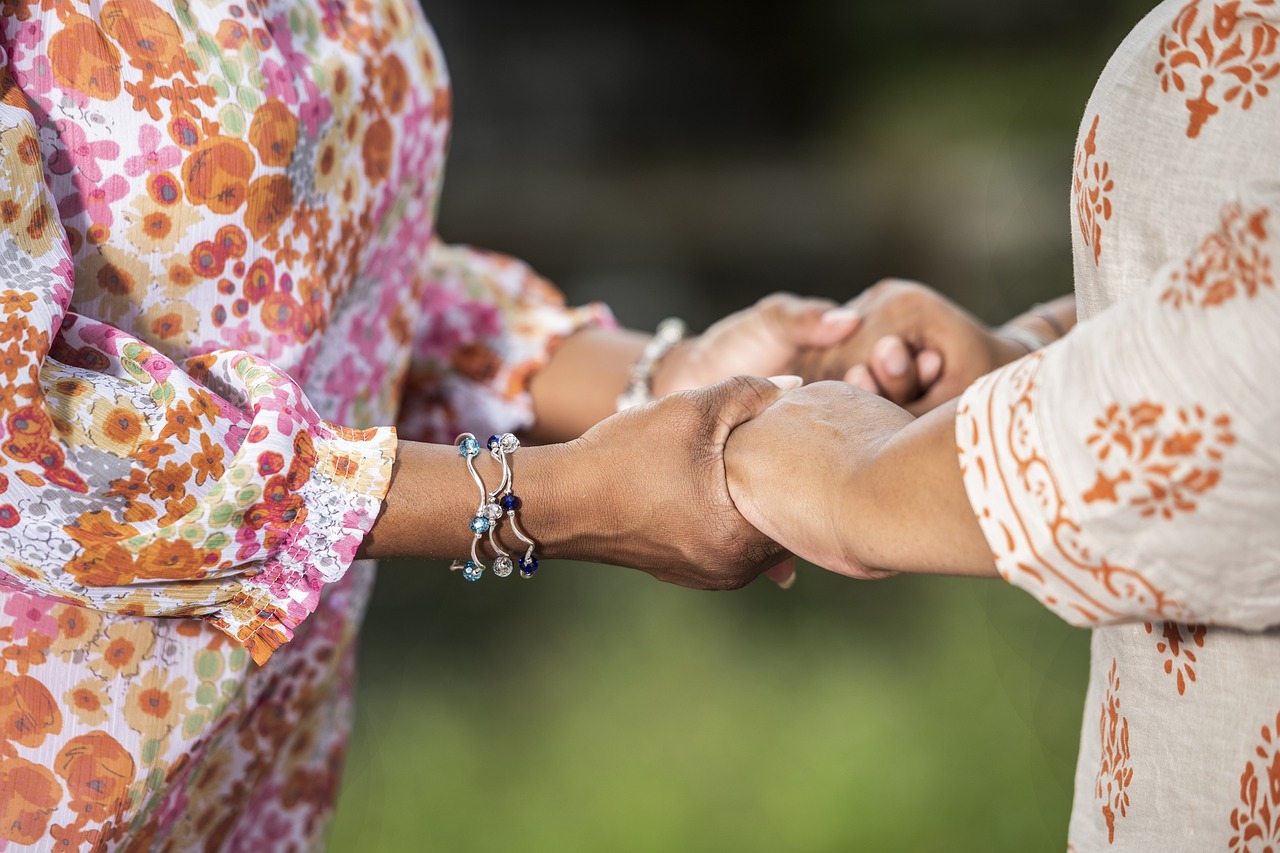With stars shining in the sky and the moon clearly visible, the couple (and friends and family if desired) stand outside their home, or in a park or meadow. After reciting the Havdalah ceremony (found in most Shabbat prayer books), they recite:
The Couple:
On this evening, we come together to bless the waxing of the moon of this month of _________,
to celebrate with the moon and the Shekhinah, and to mourn our loss;
to pray, to study, to reflect,
to gain strength and hope;
to prepare ourselves to make a new beginning.
Listen to our voice, O God,
May our words be fitting.
Receive our prayers with love and compassion.
Turn Your face of tenderness toward us as we turn our face toward You.
Return us to You and we shall return. Renew our days and dreams as of old.
KIDDUSH LEVANAH (Blessing the Moon)
Praise the Lord from the heavens, praise the Lord from the heights, every creature praise God, sun and moon, heaven and earth.
Praised are You, our God, Provider and Protector of all the world, who with Your words created the vastness of the heavens, and with Your breath all the life within it. A time and a season You gave to them all, so that they not falter at their appointed task. They are happy and joyous to fulfil1 the desire of their Creator – the Worker of truth whose work is truth. And to the moon, God said “Be renewed as a crown of splendor for those borne from the womb, for they too will one day be renewed like you and praise their Creator.” Blessed are You, God, who renews the months.
May it be Your will, our God and God of our ancestors, to repair the imperfection of the moon, to replenish her so that she be diminished no more. Let her light glow like the sun’s, let it stream with the primordial light of the first days of creation, as it was before her fading, as it says, “the two great lights.”
WORDS OF MOURNING
A cry is heard in Ramah, lamentation and bitter weeping. Rachel cries for her children. She refuses to be comforted for her children, for they are not. (Jer. 31 15)
The joy of our hearts has ceased; our dance is turned into mourning. (Lam. 5: 15)
Scarcely are they planted;
scarcely are they sown;
scarcely has their stock taken root in the earth.
God merely blows upon them and they wither;
and the storm wind takes them away as stubble. (Isaiah 40: 24)
Our losses press hard upon us, God.
Woman:
Be gracious to me, O God, for I am sorely wounded. My eyes, my soul, and my womb are consumed with grief. I am like a broken vessel. (Ps. 31 10,13) Our cry, too, is heard in Ramah, with those who suffered before us and who suffer beside us. The cries of Sarah, Rebecca, Rachel, Leah, and Hannah are echoed in mine, and in our lamentation and weeping.
The Couple:
Alas, how does she sit lonely,
Jerusalem,
once great with people,
Once full of life.
Bitterly she weeps in the night.
Her cheek wet with tears.
There is none to comfort her. (Adapted from Lam. I l-2)
O Zion, let tears run down like a river day and night,
Pour out your heart like water before God,
Lift up your hands toward God for the life of your young children. (Lam. 2: 18-19)
We have no redeeming angel, just the two of us together, each of us alone. (Yehudah Amichai)
WORDS OF CONSOLATION
The Man:
And yet, our rabbis teach that on the day the Temple was destroyed, the redeemer was born.
The Woman:
And we know that every monthly menstrual flow is both end and beginning, a dying and an awakening anew for the possibility of life.
Every opening of the womb, timely or untimely, starts a new cycle on its course, a new personal calendar.
God brings everything to pass precisely at its time. (Based on Eccles. 3:11
The Couple:
The Lord our God causes a woman to dwell barren in her house in order to make her the joyful mother of children. (Ps.113:9)
God, it is said that You try only the righteous, as You tried Sarah and Hannah, each according to her strength, to dwell barren in her house…in order to make her rejoice the more in her children. (Pesikta Rabbati 43: 5)
We are not so righteous that we have the strength to suffer so. Please, let the days of our testing be over.
Hear our pleas; comfort us in our hour of sadness.
All barren women everywhere in the world were remembered together with Sarah. All were with child and gave birth to children at the same time she did. (Pesikta Rabbati 42: 4)
After the weeping, singing will be heard:
“I shall rebuild Jerusalem as a joy, and her people as a delight.” (Isa. 65: 18)
RITUALS OF CONSOLATION
The Couple:
The couple expresses mourning and consolation as they offer a prayer for the one they lost (adapted from the classic mourner’s prayer El Malei Rachamim and based on Isa. 53 2):
God, filled with compassion, dwelling on high,
Grant perfect rest under the wings of the Shekhinah,
among the holy and pure ones who shine brilliantly as the heavens,
To the soul of the little one, our little one,
the tiniest of beginnings –
a slight and small beginning,
a tiny and tender root –
lacking form and beauty and countenance
but still desired and loved.
To make the transition to a ceremonial meal, the couple washes their faces and their hands.
As they do so, they tell of Joseph, who was overcome with emotion when he first saw his brother Benjamin after several years.
The Couple:
“And he went into his room and cried there. And when he was done, he washed his face and came out. Then, in control of himself, he said “Now, let the meal begin.” (Gen. 43:30-31)
All present join in eating the meal of foods symbolizing life, fertility, the Temple, and God’s care: round challahs, hard-boiled eggs, and water. They may include other foods such as lentils, chickpeas, bagels, and grapes.
While gathered together for the meal, the participants may do what mourners often do in memory of loved ones: study a text from the Torah or offer a devar torah, a short, personal exposition of a classic text. They may also pledge a gift to charity.
CLOSURE
At the end of the meal, the guests take their leave by reciting to the couple:
All:
As the heavens are established forever, and the cycles of
moons and of months are ever renewed, so, too, may your
cycles of hope, fruitfulness, and love resume.
The Couple:
May we, like them, become faithful and joyous workers, and our work truth.
All:
May the words of the psalmist come true:
“Though they walk weeping while bearing their sacks of seed, they shall return with songs of joy, carrying their sheaves of grain.” (Ps. 126:6)
* A text that lends itself well to study here is the ninth chapter of the talmudic tractate of Blessings: “If a person witnesses a shooting star, or an earthquake, or lightning, or thunder, he should say, ‘Blessed are You whose power and might fill the world.’ If a person happens upon mountains, or hills, or seas, or rivers, or deserts, he should say, ‘Blessed is the One who fashions creation.’ For rain and good tidings, one should say: ‘Blessed are You, who is good and does good.’ For bad tidings, one should say, ‘Blessed are You who has given us life.'”
Used with the permission of the author. Excerpted from a larger work and published in Tears of Sorrow, Seeds of Hope by Nina Beth Cardin (Woodstock, VT: Jewish Lights Publishing, 1999).













